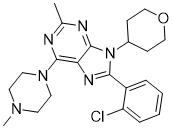
LY2828360
A new study from Indiana University suggests that a drug proven safe for use in people may prevent opioid tolerance and physical dependence when used in combination with opioid-based pain medications.
Researchers in the Linda and Jack Gill Center for Biomolecular Science at IU Bloomington have discovered that a compound previously tested to treat osteoarthritis pain appears to block neuropathic pain and decrease signs of opioid dependence. The work is reported in the journal Molecular Pharmacology.
Human trials of the drug to treat osteoarthritis pain conducted by Indianapolis-based drug manufacturer Eli Lilly and Co. found that the drug lacked efficacy. However, the drug's use in treating other kinds of pain and lessening opioid dependence had not been tested before.
"The potential to quickly begin using this compound in combination with opioid-based medication to treat pain and reduce addiction makes this discovery very significant," said lead investigator Andrea G. Hohmann, a Linda and Jack Gill Chair of Neuroscience and professor in the IU Bloomington College of Arts and Sciences' Department of Psychological and Brain Sciences. "We already know this drug is safe for use in people, so moving into human trials will not require as many regulatory hurdles."
The need for non-addictive alternatives to opioid-based pain medication is urgent due to the rapid rise in overdose deaths over the past decade. According to the Centers for Disease Control and Prevention, over 64,000 Americans died from drug overdoses in 2016, including from illicit drugs and prescription opioids. To tackle this issue, IU last year launched the Responding to the Addictions Crisis Grand Challenge initiative to invest $50 million to prevent and reduce addictions in Indiana.
To test the potential of the experimental drug to treat pain and reduce addiction symptoms, IU scientists administered the compound and the opioid morphine to male mice with neuropathic pain. While morphine initially reduced the pain, mice quickly developed tolerance to morphine's effectiveness, similar to people who require higher doses of opioid over time to achieve relief.
Ref : http://molpharm.aspetjournals.org/content/93/2/49

No comments:
Post a Comment